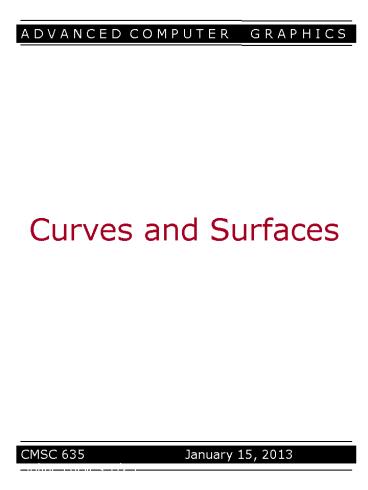Curves and Surfaces - PowerPoint PPT Presentation
Title:
Curves and Surfaces
Description:
P0 P1 1-u u F(u) = (1-u) P0 + u P1 deCastljau: Quadratic Bezier Curve P0 P1 P2 Quadratic Degree 2, Order 3 F(0) = P0, F(1) = P2 F(u) = ? F(u) = (1-u)2 P0 + 2u ... – PowerPoint PPT presentation
Number of Views:115
Avg rating:3.0/5.0
Title: Curves and Surfaces
1
Curves and Surfaces
2
To do
- Continue to work on ray programming assignment
- Start thinking about final project
3
Curved Surfaces
- Motivation
- Exact boundary representation for some objects
- More concise representation that polygonal mesh
- Easier to model with and specify for many
man-made objects and machine parts (started with
car bodies)
4
Curve and surface Representations
- Curve representation
- Function y f(x)
- Implicit f(x, y) 0
- Subdivision (x, y) as limit of recursive process
- Parametric x f(t), y g(t)
- Curved surface representation
- Function z f(x, y)
- Implicit f(x, y, z)0
- Subdivision (x, y, z) as limit of recursive
process - Parametric x f(s, t), yg(s, t), z h(s, t)
5
Parametric Surfaces
- Boundary defined by parametic function
- x f(u, v)
- y f(u, v)
- Z f(u, v)
- Example (sphere)
- X sin (?) cos (?)
- Y sin (?) sin (?)
- Z cos(?)
6
Parametric Representation
- One function vs. many (defined piecewise)
- Continuity
- A parametric polynomial curve of order n
- Advantages of polynomial curves
- Easy to compute
- Infinitely differentiable everywhere
7
Spline Constructions
- Cubic spline is the most common form
- Common constructions
- Bezier 4 control points
- B-splines approximating C2, local control
- Hermite 2 points, 2 normals
- Natural splines interpolating, C2, no local
control - Catmull-Rom interpolating, C1, local control
8
Bezier Curve
- Motivation Draw a smooth intuitive curve (or
surface) given a few key user-specified control
points - Properties
- Interpolates is tangent to end points
- Curve within convex hull of control polygon
Control point
Control polygon
Smooth Bezier curve (drawn automatically)
9
Linear Bezier Curve
- Just a simple linear combination or interpolation
(easy to code up, very numerically stable)
P1
F(1)
Linear (Degree 1, Order 2) F(0) P0, F(1)
P1 F(u) ?
F(u)
P0
F(0)
10
deCastljau Quadratic Bezier Curve
Quadratic Degree 2, Order 3 F(0) P0, F(1)
P2 F(u) ?
F(u) (1-u)2 P0 2u(1-u) P1 u2 P2
11
Geometric Interpretation Quadratic
u
1-u
1-u
u
u
12
Geometric Interpolation Cubic
13
Summary deCasteljau Algorithm
- A recursive implementation of curves at different
orders
P1
P0
Linear Degree 1, Order 2 F(0) P0, F(1) P1
14
Summary deCasteljau Algorithm
- A recursive implementation of curves at different
orders - Further consideration polar coordinates
15
Bezier disadvantages
- Single piece, no local control (move a control
point, whole curve changes) - Complex shapes can be very high degree,
difficult to deal with - In practice combine many Bezier curve segments
- But only position continuous at the joint points
since Bezier curves interpolate end-points (which
match at segment boundaries) - Unpleasant derivative (slope) discontinuities at
end-points
16
Piecewise polynomial curves
- Ideas
- Use different polynomial functions for different
parts of the curve - Advantage
- Flexibility
- Local control
- Issue
- Smoothness at joints (G geometry continuity C
derivative continuity)
17
Continuity
- Continuity Ck indicates adjacent curves have the
same kth derivative at their joints - C0 continuity Adjacent curves share
- Same endpoints Qi(1) Qi1(0)
- C-1 discontinuous curves
18
Continuity
- C1 continuity Adjacent curves share
- Same endpoints Qi(1) Qi1(0) and
- Same derivativeQi(1) Qi1(0)
- C2 continuity
- Must have C1 continuity, and
- Same second derivatives Qi (1) Qi1 (0)
- Most engineering applications (e.g., those in car
and airplane industry) require at least C1
continuity
19
Splines
- More useful form of representation compared to
the Bezier curve - How they work Parametric curves governed by
control points - Mathematically Several representations to choose
from. More complicated than vertex lists. See
chapter 22 of the book for more information. - Simple parametric representation
- Advantage Smooth with just a few control point
- Disadvantage Can be hard to control
- Uses
- representation of smooth shapes. Either as
outlines in 2D or with Patches or Subdivision
Surfaces in 3D - animation Paths
- approximation of truncated Gaussian Filters
20
A Simple Animation Example
- Problem create a car animation that is driving
up along the y-axis with velocity 0, 3, and
arrive at the point (0, 4) at time t0. Animate
its motion as it turns and slows down so that at
time t1, it is at position (2, 5) with velocity
2, 0.
- Solution
- First step generate a mathematical description.
- Second step choose the curve representation
- Hermite curve r(t)GMT(t)
- Exercise Bezier curve representation?
21
Catmull Rom Spline
- Can be used to solve the following problem.
- Solution
- Math representation
- Curve construction
- Catmull Rom spline to construct the vectors from
the two or three neighbors - take home exercise read chap 22 in the book and
construct the curve and the B-spline using the
Chen code.
22
Subdivision curves
- A simple idea
- Using the midpoint of the edge from one point to
the next, replace that point with a new one to
create a new polygon to construct a new curve. - problem with this?
- Further readings
- Laplacian interpolation and smoothing (Gabriel
Taubin _at_ Brown) - Joe Warren_at_ Rice (on mesh)
23
Surfaces
- Curves -gt Surfaces
- Bezier patch
- 16 points
- Check out the Chen code for surface construction































